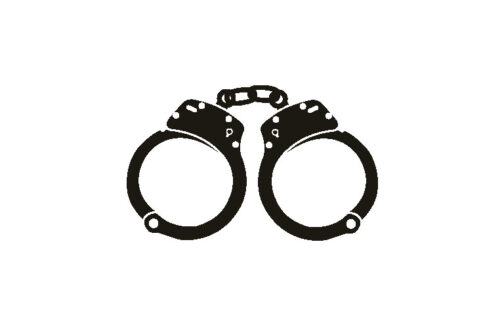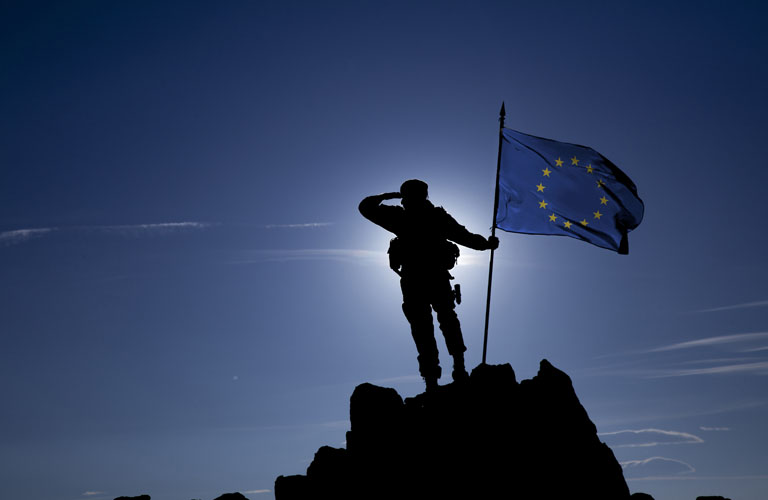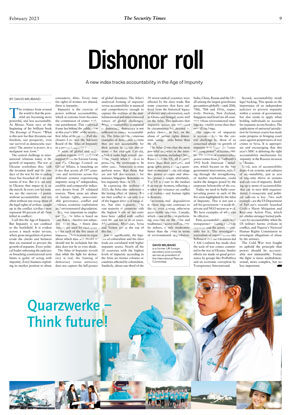Dishonor roll
 Credit: Shutterstock/NikolayPetrovich
Credit: Shutterstock/NikolayPetrovich A new index tracks accountability in the Age of Impunity
The evidence from around the world is that the powerful are becoming more powerful, and less accountable. As Moises Naim says at the beginning of his brilliant book The Revenge of Power: “What is this new foe that threatens our freedom, our prosperity, even our survival as democratic societies? The answer is power, in a malignant new form.”
The central challenge in international relations today is the growth of impunity. The war in Ukraine symbolizes this: Both the invasion itself and the conduct of the war by the invading force has breached all laws and norms of war. But it is not only in Ukraine that impunity is on the march. In every conflict zone, we see the exercise of power without accountability, and too often without any recognition of the legal rights of civilians caught up in the conflict (civilians now represent 84 percent of all those killed in conflict).
I call this the Age of Impunity. But Impunity is not confined to the battlefield. It is evident across a much wider terrain, where gross inequalities of power erode the checks and balances that are essential to prevent the growth of impunity. Every political leader suborning the judiciary or breaching constitutional term limits is guilty of acting with impunity. Every business exploiting its market position to abuse consumers, ditto. Every time the rights of women are abused, there is impunity.
Impunity is the exercise of power without accountability, which in extreme form becomes the commission of crimes without punishment. This analytical frame lies behind the publication at this year’s MSC of the world’s first Atlas of Impunity. (Full disclosure: I co-chair the Advisory Board of the Atlas of Impunity in a personal capacity.)
A team of global and independent experts, with analytical support from the Eurasia Group and the Chicago Council on Global Affairs, is launching an index that scores all 197 countries and territories across five different systems experiencing impunity using 67 independent, credible and comparable indicators drawn from 29 validated sources. These areas are abuse of human rights, unaccountable governance, conflict and violence, economic exploitation and environmental degradation.
It is very important to emphasize that the Atlas is based on data that is objective not subjective. More than a dozen data sources are used for each country for each of the five areas of impunity. There is room to argue about which data sets should or should not be included; but the data does not lie or even shade.
The Atlas of Impunity reveals that while the fight for democracy is real, the framing of democracy versus autocracy does not capture the full picture of global dynamics. The Atlas’s analytical framing of impunity versus accountability is nuanced and comprehensive enough to capture the realities of the multidimensional and interconnected nature of global challenges. While accountability is essential to democracy, democracy is not sufficient to ensure accountability. The Atlas reveals numerous examples of democratic nations that are not accountable for their actions in certain dimensions – for example Canada, which it ranks high overall, performs poorly when it comes to protecting the environment. In other cases, democratic nations perform worse than those that are not full democracies – for instance, Singapore demonstrates less impunity than the US.
In capturing the realities of 2023, the Atlas also underscores the lasting effect of history. We see that conflict is not only one of the biggest drivers of inequality, but also impunity. The vast majority of countries with the highest levels of impunity have been riddled with conflict over the last ten or more years. Afghanistan, Myanmar, Syria and Yemen are at the top of this list.
Just as significantly, the legacies of colonialism and the slave trade are correlated with higher impunity scores. Nearly all the 20 countries with the highest levels of impunity according to the Atlas are former colonies or countries affected by colonialism. Similarly, about one-third of the 30 worst-ranked countries were affected by the slave trade. But some countries that have suffered from the historical legacy of slavery and colonization, such as Ghana and Senegal, score well on the Atlas. This indicates that impunity scores are informed by circumstance but dictated by policy choices. In fact, on the abuse of human rights dimension, Senegal ranks better than the US.
The Atlas shows that the most powerful countries in the international system, including China, Russia and the US, all perform worse than their economic and geographic peers, giving a quantitative measure to the old adage that power corrupts and absolute power corrupts absolutely. The US is closer to the median than top performers, reflecting a weaker performance on conflict and violence and human rights indicators.
Environmental degradation is where impunity continues to thrive, even among otherwise accountable societies. Canada, which is one of the best-performing countries on the Atlas and traditionally scores well on similar indices, is only moderately better than the mean in terms of environmental degradation. India, China, Russia and the US – all among the largest greenhouse gas emitters globally – rank 20th, 70th, 78th and 101st, respectively. Norway, New Zealand, Singapore and Israel are all countries whose environmental rankings are notably worse than their overall rankings.
The opposite of impunity is accountability. So the central challenge for those of us concerned about the growth of impunity is to foster the “countervailing power” of accountability. The notion of countervailing power comes from JK Galbraith’s 1952 book American Capitalism, which focuses on the way government intervention, including through the strengthening of market mechanisms, could tackle the dangers posed by the corporate behemoths of the era.
Today we need to build countervailing power in each of the five areas highlighted by the Atlas of Impunity. This is not just a job for government – it needs the private and NGO sectors as well. We have examples of what can be effective.
First, accountability starts with transparency – shining a light on impunity and the actors responsible for it. The investigative journalism of organizations like Bellingcat and the Ukrainian-led 5 AM Coalition has made clear the scale of war crimes committed in the war in Ukraine. Similar efforts are made on good governance by groups like ProPublica and on economic corruption by Transparency International.
Second, accountability needs legal backing. This speaks to the importance of an independent judiciary to prevent impunity within a system of government, but also needs to apply when holding individuals to account for impunity across borders. The application of universal jurisdiction by German courts has made some progress in bringing court cases against perpetrators of war crimes in Syria. It is appropriate and encouraging that this year’s MSC is debating the right accountability mechanisms for impunity in the Russian invasion of Ukraine.
Third, acts of accountability depend on systems and cultures of accountability, just as acts of impunity thrive in systems and cultures of impunity. Building up systems of accountability that can in turn shift organizational, bureaucratic and political cultures is key. Two such examples are the US Department of Defense’s recently launched Civilian Harm Mitigation and Response Action Plan, which establishes stronger formal pathways for accountability when the US military harms civilians in conflict, and Nigeria’s National Human Rights Commission to investigate allegations of abuse by the military.
The Cold War was fought to uphold the principle that power should be accountable not immutable. Today the fight is more multidimensional, more complex, but no less important.
David Miliband is a former UK foreign secretary and currently serves as president of the International Rescue Committee.




